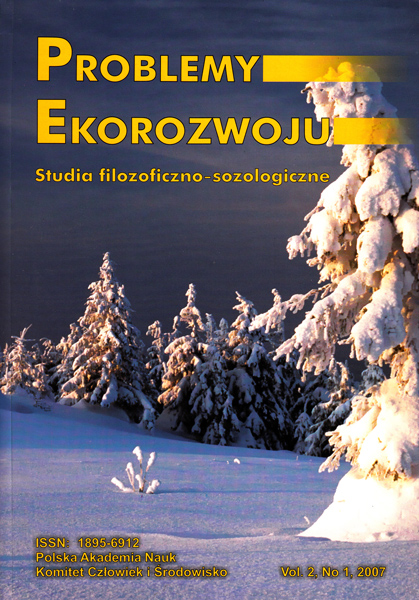The Philosophical Background of Sustainable Development
Article Sidebar
Issue Vol. 2 No. 1 (2007)
-
Editorial
Artur Pawłowski1-4
-
The Philosophical Background of Sustainable Development
Zdzisława Piątek5-18
-
Philosophical and Axiological Basis of Ecodevelopment
Włodzimierz Zięba19-25
-
Ethical Basis of Sustainable Development
Dariusz Liszewski27-33
-
Axiological Associations of the Notion of Sustainable Development
Rober Piotrowski35-39
-
Ethical Assumptions of Sustainable Development Education
Włodzimierz Tyburski41-47
-
Does the Idea of the Sustainable Development Show a New Vision of the Development of the Civilization?
Zbigniew Hull49-57
-
Barriers in Introducing Sustainable Development
Artur Pawłowski59-65
-
Education for Sustainable Development
Ewa Białek67-73
-
Demography and Ethics in Ecodevelopment – Chances and Threats
Stanisław Jedynak75-77
-
Information: XXIV International Scientific Conference “System Dynamice Society”, 30-31.07.06. Dynamical Monitoring in Creating informative Basis for Permanent Development
Lesław Michnowski79-81
Archives
-
Vol. 6 No. 2
2011-07-01 19
-
Vol. 6 No. 1
2011-01-03 18
-
Vol. 4 No. 2
2009-07-01 19
-
Vol. 4 No. 1
2009-01-05 22
-
Vol. 3 No. 2
2008-07-01 19
-
Vol. 3 No. 1
2008-01-02 12
-
Vol. 2 No. 2
2007-07-02 13
-
Vol. 2 No. 1
2007-01-02 11
-
Vol. 1 No. 2
2006-07-03 15
-
Vol. 1 No. 1
2006-01-02 8
Main Article Content
Authors
Abstract
The present paper discusses the problems connected with the philosophical justification of sustainable development. In this context ecophilosophy is perceived as a new branch of philosophy devoted to the search for theoretical grounds for sustainable development of the human world in a symbiosis with Nature. When we confront the main ideas of ecophilosophy with those of traditional philosophy the basic motivation of philosophical inquiry changes considerably. The new philosophy does not try to justify human exploitation of Nature; by endowing the biosphere with a value per se, but rather contemplates the possibility of a harmonious coexistence of human beings with all other creatures living in the biosphere. Sustainable development is understood as a search for a proper measure of human activity in the environment. It is a mechanism that should be incorporated into the development of western civilization so that our civilization does not choke on its own power. The potential of ecophilosophy depends on the response to the question: “Is the antagonism between Nature and culture inevitable?” This paper tries to demonstrate that it is not.
Keywords:
References
ARENDT H. (2000), Kondycja ludzka, Aletheia, Warszawa 2000.
DEMBIŃSKA-SIURY D. (1991), Człowiek odkrywa człowieka, Wiedza Powszechna, Warszawa 1991.
DOBZHANSKY T. (1979), Różnorodność i równość, PIW, Warszawa 1979.
DORST J. (1987), Siła życia, PIW, Warszawa 1987.
FERRY L. (1998), Człowiek-Bóg, czyli o sensie życia, PIW, Warszawa 1998.
FERRY L. (1995), Nowy ład ekologiczny, Centrum Uniwersalizmu, Warszawa 1995.
FIUT I. (2003), Ekofilozofia, geneza i problemy, Stow. Twórcze, Art.-Liter. Kraków 2003.
KANT I., (1968), Co to jest Oświecenie?, w: T. Kroński, Kant, Wiedza Powszechna, Warszawa 1968.
KOŁAKOWSKI L., (1999), Mini wykłady o maxi sprawach, Znak, Kraków 1999.
LAZARI PAWŁOWSKA, I. (1976), Schweitzer, Wiedza Powszechna, Warszawa 1979.
LORENZ K., (1986), Regres człowieczeństwa, PIW, Warszawa 1986.
LEWONTIN R.C., (1996), Geny, środowisko i organizmy, w: Ukryte teorie nauki, Znak, Kraków 1996.
MEADOWS D.H. MEADOWS D.L. RANDERS J. (1995), Przekraczanie granic, Globalne załamanie czy bezpieczna przyszłość, Centrum Uniwersalizmu przy Uniwersytecie Warszawskim, Warszawa 1995.
STUART M. J., (1993), Three Essays on Religion, Thoemmes Press, Bristol 1993, England.
SCHWEITZER A., (1974), Życie, Inst. Wyd. PAX, Warszawa 1974.
PIĄTEK Z., (2005), Człowiek jako podmiot zrównoważonego rozwoju, Konsekwencje filozoficzno-społeczne, w: Zrównoważony rozwój, Od utopii do praw człowieka, red. A.Papuziński, Oficyna Wyd. Branta, Bydgoszcz 2005.
SIMONNET D., (1979), L'Ecologisme, Presses Univ. de France 1979.
Article Details
Abstract views: 42
License

This work is licensed under a Creative Commons Attribution-ShareAlike 4.0 International License.


